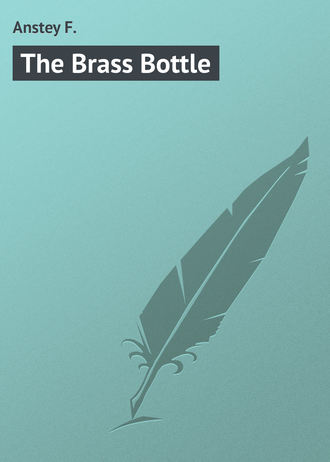 полная версия
полная версияThe Brass Bottle
Fakrash shifted his seat on the cornice. "I have committed no act of disrespect unto the Lord Mayor," he said, "therefore he can have no just cause of anger against me."
Horace perceived that the Jinnee was not altogether at ease, and pushed his advantage accordingly.
"My dear good old friend," he said, "you don't seem to realise yet what an awful thing you've done. For your own mistaken purposes, you have compelled the Chief Magistrate and the Corporation of the greatest City in the world to make themselves hopelessly ridiculous. They'll never hear the last of this affair. Just look at the crowds waiting patiently below there. Look at the flags. Think of that gorgeous conveyance of yours standing outside the Guildhall. Think of the assembly inside – all the most aristocratic, noble, and distinguished personages in the land," continued Horace, piling it on as he proceeded; "all collected for what? To be made fools of by a Jinnee out of a brass bottle!"
"For their own sakes they will preserve silence," said Fakrash, with a gleam of unwonted shrewdness.
"Probably they would hush it up, if they only could," conceded Horace. "But how can they? What are they to say? What plausible explanation can they give? Besides, there's the Press: you don't know what the Press is; but I assure you its power is tremendous – it's simply impossible to keep anything secret from it nowadays. It has eyes and ears everywhere, and a thousand tongues. Five minutes after the doors in that hall are unlocked (and they can't keep them locked much longer) the reporters will be handing in their special descriptions of you and your latest vagaries to their respective journals. Within half an hour bills will be carried through every quarter of London – bills with enormous letters: 'Extraordinary Scene at the Guildhall.' 'Strange End to a Civic Function.' 'Startling Appearance of an Oriental Genie in the City.' 'Abduction of a Guest of the Lord Mayor.' 'Intense Excitement.' 'Full Particulars!' And by that time the story will have flashed round the whole world. 'Keep silence,' indeed! Do you imagine for a moment that the Lord Mayor, or anybody else concerned, however remotely, will ever forget, or be allowed to forget, such an outrageous incident as this? If you do, believe me, you're mistaken."
"Truly, it would be a terrible thing to incur the wrath of the Lord Mayor," said the Jinnee, in troubled accents.
"Awful!" said Horace. "But you seem to have managed it."
"He weareth round his neck a magic jewel, which giveth him dominion over devils – is it not so?"
"You know best," said Horace.
"It was the splendour of that jewel and the majesty of his countenance that rendered me afraid to enter his presence, lest he should recognise me for what I am and command me to obey him, for verily his might is greater even than Suleyman's, and his hand heavier upon such of the Jinn as fall into his power!"
"If that's so," said Horace, "I should strongly advise you to find some way of putting things straight before it's too late – you've no time to lose."
"Thou sayest well," said Fakrash, springing to his feet, and turning his face towards Cheapside. Horace shuffled himself along the ledge in a seated position after the Jinnee, and, looking down between his feet, could just see the tops of the thin and rusty trees in the churchyard, the black and serried swarms of foreshortened people in the street, and the scarlet-rimmed mouths of chimney-pots on the tiled roofs below.
"There is but one remedy I know," said the Jinnee, "and it may be that I have lost power to perform it. Yet will I make the endeavour." And, stretching forth his right hand towards the east, he muttered some kind of command or invocation.
Horace almost fell off the cornice with apprehension of what might follow. Would it be a thunderbolt, a plague, some frightful convulsion of Nature? He felt sure that Fakrash would hesitate at no means, however violent, of burying all traces of his blunder in oblivion, and very little hope that, whatever he did, it would prove anything but some worse indiscretion than his previous performances.
Happily none of these extreme measures seemed to have occurred to the Jinnee, though what followed was strange and striking enough.
For presently, as if in obedience to the Jinnee's weird gesticulations, a lurid belt of fog came rolling up from the direction of the Royal Exchange, swallowing up building after building in its rapid course; one by one the Guildhall, Bow Church, Cheapside itself, and the churchyard disappeared, and Horace, turning his head to the left, saw the murky tide sweeping on westward, blotting out Ludgate Hill, the Strand, Charing Cross, and Westminster – till at last he and Fakrash were alone above a limitless plain of bituminous cloud, the only living beings left, as it seemed, in a blank and silent universe.
"Look again!" said Fakrash, and Horace, looking eastward, saw the spire of Bow Church, rosy once more, the Guildhall standing clear and intact, and the streets and house-tops gradually reappearing. Only the flags, with their unrestful shiver and ripple of colour, had disappeared, and, with them, the waiting crowds and the mounted constables. The ordinary traffic of vans, omnibuses, and cabs was proceeding as though it had never been interrupted – the clank and jingle of harness chains, the cries and whip-crackings of drivers, rose with curious distinctness above the incessant trampling roar which is the ground-swell of the human ocean.
"That cloud which thou sawest," said Fakrash, "hath swept away with it all memory of this affair from the minds of every mortal assembled to do thee honour. See, they go about their several businesses, and all the past incidents are to them as though they had never been."
It was not often that Horace could honestly commend any performance of the Jinnee's, but at this he could not restrain his admiration. "By Jove!" he said, "that certainly gets the Lord Mayor and everybody else out of the mess as neatly as possible. I must say, Mr. Fakrash, it's much the best thing I've seen you do yet."
"Wait," said the Jinnee, "for presently thou shalt see me perform a yet more excellent thing."
There was a most unpleasant green glow in his eyes and a bristle in his thin beard as he spoke, which suddenly made Horace feel uncomfortable. He did not like the look of the Jinnee at all.
"I really think you've done enough for to-day," he said. "And this wind up here is rather searching. I shan't be sorry to find myself on the ground again."
"That," replied the Jinnee, "thou shalt assuredly do before long, O impudent and deceitful wretch!" And he laid a long, lean hand on Horace's shoulder.
"He is put out about something!" thought Ventimore. "But what?" "My dear sir," he said aloud, "I don't understand this tone of yours. What have I done to offend you?"
"Divinely gifted was he who said: 'Beware of losing hearts in consequence of injury, for the bringing them back after flight is difficult.'"
"Excellent!" said Horace. "But I don't quite see the application."
"The application," explained the Jinnee, "is that I am determined to cast thee down from here with my own hand!"
Horace turned faint and dizzy for a moment. Then, by a strong effort of will, he pulled himself together. "Oh, come now," he said, "you don't really mean that, you know. After all your kindness! You're much too good-natured to be capable of anything so atrocious."
"All pity hath been eradicated from my heart," returned Fakrash. "Therefore prepare to die, for thou art presently about to perish in the most unfortunate manner."
Ventimore could not repress a shudder. Hitherto he had never been able to take Fakrash quite seriously, in spite of all his supernatural powers; he had treated him with a half-kindly, half-contemptuous tolerance, as a well-meaning, but hopelessly incompetent, old foozle. That the Jinnee should ever become malevolent towards him had never entered his head till now – and yet he undoubtedly had. How was he to cajole and disarm this formidable being? He must keep cool and act promptly, or he would never see Sylvia again.
As he sat there on the narrow ledge, with a faint and not unpleasant smell of hops saluting his nostrils from some distant brewery, he tried hard to collect his thoughts, but could not. He found himself, instead, idly watching the busy, jostling crowd below, who were all unconscious of the impending drama so high above them. Just over the rim of the dome he could see the opaque white top of a lamp on a shelter, where a pigmy constable stood, directing the traffic.
Would he look up if Horace called for help? Even if he could, what help could he render? All he could do would be to keep the crowd back and send for a covered stretcher. No, he would not dwell on these horrors; he must fix his mind on some way of circumventing Fakrash.
How did the people in "The Arabian Nights" manage? The fisherman, for instance? He persuaded his Jinnee to return to the bottle by pretending to doubt whether he had ever really been inside it.
But Fakrash, though simple enough in some respects, was not quite such a fool as that. Sometimes the Jinn could be mollified and induced to grant a reprieve by being told stories, one inside the other, like a nest of Oriental boxes. Unfortunately Fakrash did not seem in the humour for listening to apologues, and, even if he were, Horace could not think of or improvise any just then. "Besides," he thought, "I can't sit up here telling him anecdotes for ever. I'd almost sooner die!" Still, he remembered that it was generally possible to draw an Arabian Efreet into discussion: they all loved argument, and had a rough conception of justice.
"I think, Mr. Fakrash," he said, "that, in common fairness, I have a right to know what offence I have committed."
"To recite thy misdeeds," replied the Jinnee, "would occupy much time."
"I don't mind that," said Horace, affably. "I can give you as long as you like. I'm in no sort of a hurry."
"With me it is otherwise," retorted Fakrash, making a stride towards him. "Therefore court not life, for thy death hath become unavoidable.'
"Before we part," said Horace, "you won't refuse to answer one or two questions?"
"Didst thou not undertake never to ask any further favour of me? Moreover, it will avail thee nought. For I am positively determined to slay thee."
"I demand it," said Horace, "in the most great name of the Lord Mayor (on whom be peace!)"
It was a desperate shot – but it took effect. The Jinnee quailed visibly.
"Ask, then," he said; "but briefly, for the time groweth short."
Horace determined to make one last appeal to Fakrash's sense of gratitude, since it had always seemed the dominant trait in his character.
"Well," he said, "but for me, wouldn't you be still in that brass bottle?"
"That," replied the Jinnee, "is the very reason why I purpose to destroy thee!"
"Oh!" was all Horace could find to say at this most unlooked-for answer. His sheet anchor, in which he had trusted implicitly, had suddenly dragged – and he was drifting fast to destruction.
"Are there any other questions which thou wouldst ask?" inquired the Jinnee, with grim indulgence; "or wilt thou encounter thy doom without further procrastination?"
Horace was determined not to give in just yet; he had a very bad hand, but he might as well play the game out and trust to luck to gain a stray trick.
"I haven't nearly done yet," he said. "And, remember, you've promised to answer me – in the name of the Lord Mayor!"
"I will answer one other question, and no more," said the Jinnee, in an inflexible tone; and Ventimore realised that his fate would depend upon what he said next.
CHAPTER XVIII
A GAME OF BLUFF"Thy second question, O pertinacious one?" said the Jinnee, impatiently. He was standing with folded arms looking down on Horace, who was still seated on the narrow cornice, not daring to glance below again, lest he should lose his head altogether.
"I'm coming to it," said Ventimore; "I want to know why you should propose to dash me to pieces in this barbarous way as a return for letting you out of that bottle. Were you so comfortable in it as all that?"
"In the bottle I was at least suffered to rest, and none molested me. But in releasing me thou didst perfidiously conceal from me that Suleyman was dead and gone, and that there reigneth one in his stead mightier a thousand-fold, who afflicteth our race with labours and tortures exceeding all the punishments of Suleyman."
"What on earth have you got into your head now? You can't mean the Lord Mayor?"
"Whom else?" said the Jinnee, solemnly. "And though, for this once, by a device I have evaded his vengeance, yet do I know full well that either by virtue of the magic jewel upon his breast, or through that malignant monster with the myriad ears and eyes and tongues, which thou callest 'The Press,' I shall inevitably fall into his power before long."
For the life of him, in spite of his desperate plight, Horace could not help laughing. "I beg your pardon, Mr. Fakrash," he said, as soon as he could speak, "but – the Lord Mayor! It's really too absurd. Why, he wouldn't hurt a hair on a fly's head!"
"Seek not to deceive me further!" said Fakrash, furiously. "Didst thou not inform me with thy own mouth that the spirits of Earth, Air, Water, and Fire were subject to his will? Have I no eyes? Do I not behold from here the labours of my captive brethren? What are those on yonder bridges but enslaved Jinn, shrieking and groaning in clanking fetters, and snorting forth steam, as they drag their wheeled burdens behind them? Are there not others toiling, with panting efforts, through the sluggish waters; others again, imprisoned in lofty pillars, from which the smoke of their breath ascendeth even unto Heaven? Doth not the air throb and quiver with their restless struggles as they writhe below in darkness and torment? And thou hast the shamelessness to pretend that these things are done in the Lord Mayor's own realms without his knowledge! Verily thou must take me for a fool!"
"After all," reflected Ventimore, "if he chooses to consider that railway engines and steamers, and machinery generally, are inhabited by so many Jinn 'doing time,' it's not to my interest to undeceive him – indeed, it's quite the contrary!"
"I wasn't aware the Lord Mayor had so much power as all that," he said; "but very likely you're right. And if you're so anxious to keep in favour with him, it would be a great mistake to kill me. That would annoy him."
"Not so," said the Jinnee, "for I should declare that thou hadst spoken slightingly of him in my hearing, and that I had slain thee on that account."
"Your proper course," said Horace, "would be to hand me over to him, and let him deal with the case. Much more regular."
"That may be," said Fakrash; "but I have conceived so bitter a hatred to thee by reason of thy insolence and treachery, that I cannot forego the delight of slaying thee with my own hand."
"Can't you really?" said Horace, on the verge of despair. "And then, what will you do?"
"Then," replied the Jinnee, "I shall flee away to Arabia, where I shall be safe."
"Don't you be too sure of that!" said Horace. "You see all those wires stretched on poles down there? Those are the pathways of certain Jinn known as electric currents, and the Lord Mayor could send a message along them which would be at Baghdad before you had flown farther than Folkestone. And I may mention that Arabia is now more or less under British jurisdiction."
He was bluffing, of course, for he knew perfectly well that, even if any extradition treaty could be put in force, the arrest of a Jinnee would be no easy matter.
"Thou art of opinion, then, that I should be no safer in mine own country?" inquired Fakrash.
"I swear by the name of the Lord Mayor (to whom be all reverence!)" said Horace, "that there is no land you could fly to where you would be any safer than you are here."
"If I were but sealed up in my bottle once more," said the Jinnee, "would not even the Lord Mayor have respect unto the seal of Suleyman, and forbear to disturb me?"
"Why, of course he would!" cried Horace, hardly daring to believe his ears. "That's really a brilliant idea of yours, my dear Mr. Fakrash."
"And in the bottle I should not be compelled to work," continued the Jinnee. "For labour of all kinds hath ever been abhorrent unto me."
"I can quite understand that," said Horace, sympathetically. "Just imagine your having to drag an excursion train to the seaside on a Bank Holiday, or being condemned to print off a cheap comic paper, or even the War Cry, when you might be leading a snug and idle existence in your bottle. If I were you, I should go and get inside it at once. Suppose we go back to Vincent Square and find it?"
"I shall return to the bottle, since in that alone there is safety," said the Jinnee. "But I shall return alone."
"Alone!" cried Horace. "You're not going to leave me stuck up here all by myself?"
"By no means," said the Jinnee. "Have I not said that I am about to cast thee to perdition? Too long have I delayed in the accomplishment of this duty."
Once more Horace gave himself up for lost; which was doubly bitter, just when he had begun to consider that the danger was past. But even then, he was determined to fight to the last.
"One moment," he said. "Of course, if you've set your heart on pitching me over, you must. Only – I may be quite mistaken – but I don't quite see how you are going to manage the rest of your programme without me, that's all."
"O deficient in intelligence!" cried the Jinnee. "What assistance canst thou render me?"
"Well," said Horace, "of course, you can get into the bottle alone – that's simple enough. But the difficulty I see is this: Are you quite sure you can put the cap on yourself – from the inside, you know?" If he can, he thought, "I'm done for!"
"That," began the Jinnee, with his usual confidence "will be the easiest of – nay," he corrected himself, "there be things that not even the Jinn themselves can accomplish, and one of them is to seal a vessel while remaining in it. I am indebted to thee for reminding me thereof."
"Not at all," said Ventimore. "I shall be delighted to come and seal you up comfortably myself."
"Again thou speakest folly," exclaimed the Jinnee. "How canst thou seal me up after I have dashed thee into a thousand pieces?"
"That," said Horace, with all the urbanity he could command, "is precisely the difficulty I was trying to convey."
"There will be no difficulty, for as soon as I am in the bottle I shall summon certain inferior Efreets, and they will replace the seal."
"When you are once in the bottle," said Horace, at a venture, "you probably won't be in a position to summon anybody."
"Before I get into the bottle, then!" said the Jinnee, impatiently. "Thou dost but juggle with words!"
"But about those Efreets," persisted Horace. "You know what Efreets are! How can you be sure that, when they've got you in the bottle, they won't hand you over to the Lord Mayor? I shouldn't trust them myself – but, of course, you know best!"
"Whom shall I trust, then?" said Fakrash, frowning.
"I'm sure I don't know. It's rather a pity you're so determined to destroy me, because, as it happens, I'm just the one person living who could be depended on to seal you up and keep your secret. However, that's your affair. After all, why should I care what becomes of you? I shan't be there!"
"Even at this hour," said the Jinnee, undecidedly, "I might find it in my heart to spare thee, were I but sure that thou wouldst be faithful unto me!"
"I should have thought I was more to be trusted than one of your beastly Efreets!" said Horace, with well-assumed indifference. "But never mind, I don't know that I care, after all. I've nothing particular to live for now. You've ruined me pretty thoroughly, and you may as well finish your work. I've a good mind to jump over, and save you the trouble. Perhaps, when you see me bouncing down that dome, you'll be sorry!"
"Refrain from rashness!" said the Jinnee, hastily, without suspecting that Ventimore had no serious intention of carrying out his threat. "If thou wilt do as thou art bidden, I will not only pardon thee, but grant thee all that thou desirest."
"Take me back to Vincent Square first," said Horace. "This is not the place to discuss business."
"Thou sayest rightly," replied the Jinnee; "hold fast to my sleeve, and I will transport thee to thine abode."
"Not till you promise to play fair," said Horace, pausing on the brink of the ledge. "Remember, if you let me go now you drop the only friend you've got in the world!"
"May I be thy ransom!" replied Fakrash. "There shall not be harmed a hair of thy head!"
Even then Horace had his misgivings; but as there was no other way of getting off that cornice, he decided to take the risk. And, as it proved, he acted judiciously, for the Jinnee flew to Vincent Square with honourable precision, and dropped him neatly into the armchair in which he had little hoped ever to find himself again.
"I have brought thee hither," said Fakrash, "and yet I am persuaded that thou art even now devising treachery against me, and wilt betray me if thou canst."
Horace was about to assure him once more that no one could be more anxious than himself to see him safely back in his bottle, when he recollected that it was impolitic to appear too eager.
"After the way you've behaved," he said, "I'm not at all sure that I ought to help you. Still, I said I would, on certain conditions, and I'll keep my word."
"Conditions!" thundered the Jinnee. "Wilt thou bargain with me yet further?"
"My excellent friend," said Horace quietly, "you know perfectly well that you can't get yourself safely sealed up again in that bottle without my assistance. If you don't like my terms, and prefer to take your chance of finding an Efreet who is willing to brave the Lord Mayor, well, you've only to say so."
"I have loaded thee with all manner of riches and favours, and I will bestow no more upon thee," said the Jinnee, sullenly. "Nay, in token of my displeasure, I will deprive thee even of such gifts as thou hast retained." He pointed his grey forefinger at Ventimore, whose turban and jewelled robes instantly shrivelled into cobwebs and tinder, and fluttered to the carpet in filmy shreds, leaving him in nothing but his underclothing.
"That only shows what a nasty temper you're in," said Horace, blandly, "and doesn't annoy me in the least. If you'll excuse me, I'll go and put on some things I can feel more at home in; and perhaps by the time I return you'll have cooled down."
He slipped on some clothes hurriedly and re-entered the sitting-room. "Now, Mr. Fakrash," he said, "we'll have this out. You talk of having loaded me with benefits. You seem to consider I ought to be grateful to you. In Heaven's name, for what? I've been as forbearing as possible all this time, because I gave you credit for meaning well. Now, I'll speak plainly. I told you from the first, and I tell you now, that I want no riches nor honours from you. The one real good turn you did me was bringing me that client, and you spoilt that because you would insist on building the palace yourself, instead of leaving it to me! As for the rest – here am I, a ruined and discredited man, with a client who probably supposes I'm in league with the Devil; with the girl I love, and might have married, believing that I have left her to marry a Princess; and her father, unable ever to forgive me for having seen him as a one-eyed mule. In short, I'm in such a mess all round that I don't care two straws whether I live or die!"
"What is all this to me?" said the Jinnee.
"Only this – that unless you can see your way to putting things straight for me, I'm hanged if I take the trouble to seal you up in that bottle!"
"How am I to put things straight for thee?" cried Fakrash, peevishly.
"If you could make all those people entirely forget that affair in the Guildhall, you can make my friends forget the brass bottle and everything connected with it, can't you?"
"There would be no difficulty in that," Fakrash admitted.
"Well, do it – and I'll swear to seal you up in the bottle exactly as if you had never been out of it, and pitch you into the deepest part of the Thames, where no one will ever disturb you."









